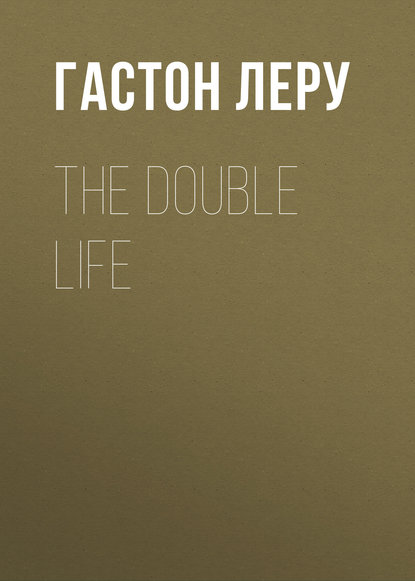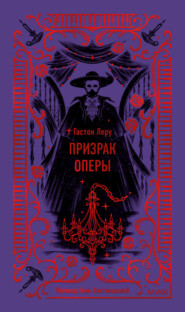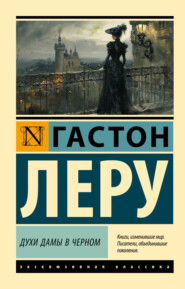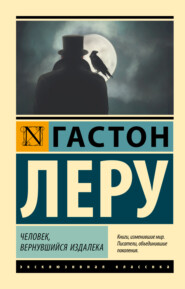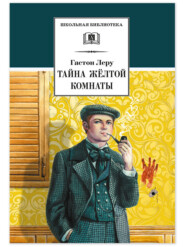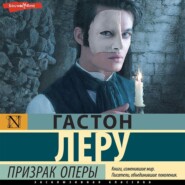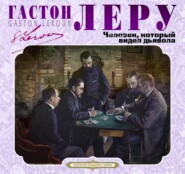По всем вопросам обращайтесь на: info@litportal.ru
(©) 2003-2024.
✖
The Double Life
Автор
Год написания книги
2018
Настройки чтения
Размер шрифта
Высота строк
Поля
CHAPTER XXIV
The Murder in the Rue Guenegaud
MARCELINE got up as much to hide her feelings as to find out if the nickel-plated revolver was in its usual place in the drawer. Upon her return she was greatly agitated, and told them that the revolver had been removed.
Théophraste advised her to calm herself, saying there was nothing of importance in that; and he proceeded to read about the crime in the Rue du Bac, saying that the journalist who wrote the narrative was more intelligent, and had made his report more interesting than the first one.
“However,” said he, “there are a few inaccuracies and omissions in his narrative. According to him one is led to think that Cartouche indulged in amorous proceedings with Mme. de Bithigne after supper. However, such a thing should not be allowed to get abroad, as no such thing happened. He had no other intention than to take supper with the lady.
“Why, my dear Marceline, if I had intended otherwise, my reputation would have suffered, and Mme. la Maréchale de Boufflers would have scorned me when I met her on July 13th, 1721.
“These gentlemen also relate that I outraged Mme. la Maréchale de Boufflers. This is all wrong. I am very fond of her on account of her intellect, and our intercourse was most polite, as well as virtuous. If they had only studied more, these journalists would have known that Madame in 1721 was over sixty years old, and I dare say Cartouche knew many younger women to play such tricks on.”
Théophraste then took up the paper:
“‘The history of the Rue du Bac is much more simple. The Prefect of Police had received a note which ran: “If you dare, come and find me; I am always at the inn in the Rue du Bac, with Bernard.” It was signed “Cartouche.” The thing had occurred after Mme. de Bithigne had told her story. The Prefect thought over his case and laid his plans.
“‘That same evening, a quarter of an hour after midnight, half a dozen policemen raided the tavern in the Rue du Bac. They were met on the stairs by a man, who, although still young, had perfectly white hair. He was endowed with almost superhuman strength, and, on seeing the police, he picked up a chair near by and started striking them. Three of them were stunned, and the others only just had time to drag the prostrated bodies of their companions into the street to prevent them from being burned by a fire started on the first landing by this man with white hair. The man saved himself by jumping from roof to roof over spaces more than thirty feet high.
“‘The new Cartouche,’ continued Théophraste, amid the scared silence of Marceline and M. Le-camus, ‘the new Cartouche has taken possession of the Rue Guenegaud. Several days ago they found in a vault-like passage there under the floor the body of a young doctor, who had been active at the death of Mme. de Bardinoldi, the mystery of which had baffled the police and press. The police had not confided to any one the fact that pinned to the young doctor’s tunic was a card on which some one had written in pencil: “We will meet each other in the other world, M. de Traneuse.” This was without doubt a crime of the new Cartouche, for the old one did in fact assassinate at this place an engineer named Traneuse. Cartouche had knocked him on the head with a stick, and the young doctor had had his skull fractured with a blunt instrument.’”
Théophraste laid down the paper, and, looking at Adolphe and Marceline, remarked that they both looked as if they were expecting a like catastrophe.
“Why, my dear Adolphe,” said he, “it is ridiculous for you to be angry at such pleasantries. I take the opportunity of telling you that I often frequent the Rue Guenegaud. That history of M. de Traneuse was to me the beginning of one of the prettiest farces that ever I played with M. d’Argenson’s spies. Following the death of M. de Traneuse (who had allowed some very improper talk about me), I was followed by two patrols of the guard, who covered me and rendered all resistance impossible. But they were ignorant that I was Cartouche, and satisfied themselves by conducting me to the Ford l’Avegne, which was the easiest prison in Paris. In this prison they put debtors, drunks, and disorderly people, and the people who have not paid their fines. They were sure that they had taken Cartouche on the 10th of January, but on the evening of the 9th Cartouche had made his escape, and took the direction of his police. It was time, for everybody was now searching the streets of Paris.
“My dear Marceline, and my dear Adolphe, you look as if you were at a funeral. That article does not lose its quota of a certain amount of wit. At first I thought it only the jest of a cheap journalist, but I see now that it is very serious, believe me. Wait for the history of the calf! Ah! We have not done yet with the affair of the Petits Augustines! Listen!”
Théophraste picked up his paper, adjusted his gold spectacles, and began again:
“‘That which was the most extraordinary in this adventure was that several times during light days they have been on the point of capturing this modern Cartouche, and that he always escaped just as the other did, by way of the chimneys. History teaches us that the true Cartouche designed on the 11th of June, 1721, to sack the Hotel Desmarets, Rue des Petits Augustines. It was one of his men, Le Ratichon, who had given him the idea. But Cartouche and Le Ratichon had been imprisoned by the police. As soon as Cartouche was in the house, the bailiffs hastened there and the place was invaded. He tranquilly closed the doors of the salons and extinguished the lights, undressed himself, climbed into the chimney, descended by another way into the kitchen, where he found a scullion, killed the scullion, disguised himself with the dead man’s clothes, and went out in fine form from the hotel, killing two bailiffs with two pistol shots because they asked him news of Cartouche. Well, what will you say when you know that our Cartouche was surrounded the day before yesterday in a confectioner’s shop in a quarter of the Augustines, escaped by the chimney, after having put on over all his effects, to prevent soiling them, the pastry cook’s blouse, which had been found on the roofs, also his pantaloons. As to the pastry cook, they found him half buried in his bake oven. But, before putting him there, as a humane precaution, the murderer, Cartouche, had assassinated him.’ ”
Here Théophraste, interrupting himself again, cried:
“Previously, previously. I had previously assassinated him.... But why do you fly into the corners? Are you afraid? Let us see, my dear Adolphe, my dear Marceline, a little coolness- you will need it for the history of the calf.”
CHAPTER XXV
The Calf’s Revenge
NEVER had Mme. Longuet or M. Lecamus been so upset before at the reading of a newspaper. The account of the atrocious murder did not seem to disturb Théophraste a bit. When he came to the part where Cartouche had placed the baker in the bake oven, Mme. Longuet groaned and could not sit still. M. Lecamus was no less disturbed, and they both rose and looked to Théophraste in amazement.
He then began to read the account of M. Houdry’s calf:
“‘M. Houdry was a head butcher on one of the small streets. Everybody came to him to buy veal, which was his specialty. This report explained itself by a fact so unusual that we can believe it only on the affirmation of M. le Commissioner of Police Mifroid, who conducted the first inquest. We know that all the butchers of Paris get their meat from the abattoirs. It was against the law for them to kill anything at home.’
“That is accurate,” said Théophraste, “that is exactly right; M. Houdry explained that to me several times, and the confidence that he placed in me by telling me the mystery of his abattoir astonished me not a little. Why should he confide to me a fact which was not known to his wife, his private clerk, a foundling whom he considered as one of the family, and his brother-in-law, who brought the calf to him each night? Why? Ah! No one knows. Perhaps it was because he couldn’t help it. You know very well that no one can escape his fate. As for me, I said to him: ‘Take care, you might end by being one of the calves!’ I resume my reading: ‘That calf was brought to him secretly each night by his brother-in-law, and as his abattoir was on a little court, behind which was the open country, no one ever saw a live calf at M. Houdry’s.
“‘The inquest will tell us from whence the calf came. M. Mifroid, the Commissioner of Police, has decided to sift the matter to the bottom, and penetrate the whole mystery.
“‘It appears that M. Houdry had his special way of killing his calf, a way that gave quality to the veal. He used to cut the calf’s throat with a bleeder.’
“Is it necessary for me,” said Théophraste, “to show you what a bleeder is?”
Going to the drawer of the sideboard, he took out the carving knife, and while explaining that a bleeder was twice as large as that, he passed it up and down M. Lecamus’ face to make him understand the method of killing the calf. He tried to get M. Lecamus to hold the knife, but by this time he was too frightened, and had retreated into a corner of the room, fearing that Théophraste would do something violent. However, he laughed at their temerity and sat down to read the further account.
“‘Yesterday, leaving early, monsieur shut himself in his abattoir as usual with his calf. He was aided by his clerk in tying the calf to the hanger. The calf being tied, the clerk busied himself in rinsing the casks before the abattoir, which the butcher always kept shut when killing.
“‘Ordinarily, M. Houdry took from twenty to thirty minutes to kill his calf, gut it and bleach it. Thirty-five minutes passed, and the double doors of the abattoir were not opened. The clerk, who had finished rinsing, noticed it with the greatest astonishment. Often M. Houdry had called him to scald the head, scrape the hairs off, and clean the ears. That particular day his master did not call him. Meanwhile, Mme. Houdry, the butcher’s wife, appeared at the door of the court.
“‘"What isthe matter there?” she asked. “Is he not finished yet?”
“‘"It is true, madame, he is a very long time.”
“‘Then she called, “Houdry! Houdry!” No response. She crossed the court and opened the abattoir door. The calf immediately escaped, and began gracefully jumping around her. She looked at the calf at once with emotion, for at that time the calf should have been dead. Then she struck a single blow on the double door, and called again to her husband, who did not answer her. She turned toward the clerk. “M. Houdry is not there,” she said. “Are you sure he has not gone out?”
“‘"Oh, madame, I am perfectly sure of it. He has not come out and no one has gone in. I have not left the court,” replied the clerk, springing at the calf’s head as it continued running around. “I am sure he is there. He is just hiding to frighten you.”
“‘"It will be better to hide the calf. Houdry! Houdry!”
“‘The clerk, with a turn of the halter, had tied the calf. Entering with Mme. Houdry he uttered a cry of surprise and said: “Oh, that is queer! When we came in there was only one calf, a single calf, madame, a calf which was tied to the hanger, and which gambols in the court now, and here is another calf on the crossbeam.” Yes, indeed, there was another calf on the tinel.
“‘"I see it now,” said Mme. Houdry. “What a small calf! But you are foolish; there should be two calves.”
“‘"Never, madame, never.”
“‘"Well, you see perfectly the calf on the beam?”
“‘The little clerk and Mme. Houdry drew near to the beam, which was in the shadow, and how astonished they were to see the kind of white meat which was hanging from the beam. They had never seen such white meat, and this meat was arranged exactly like the calf’s. They accounted for this finally by deciding that it was not veal meat.
“‘"What a curious calf,” the clerk continued to repeat.
“‘"It is not a small calf,” said Mme. Houdry. “No! no!”
“‘"All the same, madame, they have decorated the skin on the stomach with the lancet. See!
What pretty patterns! There are two hearts, some arrows, some flowers …Ah! those beautiful flowers.” The clerk raised up the lungs from which hung the heart.
“‘"It is a beautiful pluck,” said he, “and has not been trufled. The heart is good.”
“‘"Yes, he had a good heart!” groaned Mme. Houdry, who was all at once terrified at what she had said.
“‘Thereupon the clerk began to weep, and without knowing why, dipped his hands in a pail of cold water which was placed beside the boiler, looking for the head of the animal, and he drew out a head. But when she saw the head, Mme. Houdry fainted, for she had recognized the head of her husband.
“‘Mme. Houdry had immediately recognized her husband’s head, and the clerk himself examined it more closely, to be sure that it was the head of his master. It was a well-cut head-well refined, well scalded, well scraped. The moustache and hair had been shaved, as they should be, and but for something unforeseen, if need be, the head of the butcher would have passed for the head of a calf.
“‘The clerk in his turn fainted, and let the head of M. Houdry roll away.
“‘Some minutes later the tragedy was discovered, judging from the disturbance in the quarter.’
The Murder in the Rue Guenegaud
MARCELINE got up as much to hide her feelings as to find out if the nickel-plated revolver was in its usual place in the drawer. Upon her return she was greatly agitated, and told them that the revolver had been removed.
Théophraste advised her to calm herself, saying there was nothing of importance in that; and he proceeded to read about the crime in the Rue du Bac, saying that the journalist who wrote the narrative was more intelligent, and had made his report more interesting than the first one.
“However,” said he, “there are a few inaccuracies and omissions in his narrative. According to him one is led to think that Cartouche indulged in amorous proceedings with Mme. de Bithigne after supper. However, such a thing should not be allowed to get abroad, as no such thing happened. He had no other intention than to take supper with the lady.
“Why, my dear Marceline, if I had intended otherwise, my reputation would have suffered, and Mme. la Maréchale de Boufflers would have scorned me when I met her on July 13th, 1721.
“These gentlemen also relate that I outraged Mme. la Maréchale de Boufflers. This is all wrong. I am very fond of her on account of her intellect, and our intercourse was most polite, as well as virtuous. If they had only studied more, these journalists would have known that Madame in 1721 was over sixty years old, and I dare say Cartouche knew many younger women to play such tricks on.”
Théophraste then took up the paper:
“‘The history of the Rue du Bac is much more simple. The Prefect of Police had received a note which ran: “If you dare, come and find me; I am always at the inn in the Rue du Bac, with Bernard.” It was signed “Cartouche.” The thing had occurred after Mme. de Bithigne had told her story. The Prefect thought over his case and laid his plans.
“‘That same evening, a quarter of an hour after midnight, half a dozen policemen raided the tavern in the Rue du Bac. They were met on the stairs by a man, who, although still young, had perfectly white hair. He was endowed with almost superhuman strength, and, on seeing the police, he picked up a chair near by and started striking them. Three of them were stunned, and the others only just had time to drag the prostrated bodies of their companions into the street to prevent them from being burned by a fire started on the first landing by this man with white hair. The man saved himself by jumping from roof to roof over spaces more than thirty feet high.
“‘The new Cartouche,’ continued Théophraste, amid the scared silence of Marceline and M. Le-camus, ‘the new Cartouche has taken possession of the Rue Guenegaud. Several days ago they found in a vault-like passage there under the floor the body of a young doctor, who had been active at the death of Mme. de Bardinoldi, the mystery of which had baffled the police and press. The police had not confided to any one the fact that pinned to the young doctor’s tunic was a card on which some one had written in pencil: “We will meet each other in the other world, M. de Traneuse.” This was without doubt a crime of the new Cartouche, for the old one did in fact assassinate at this place an engineer named Traneuse. Cartouche had knocked him on the head with a stick, and the young doctor had had his skull fractured with a blunt instrument.’”
Théophraste laid down the paper, and, looking at Adolphe and Marceline, remarked that they both looked as if they were expecting a like catastrophe.
“Why, my dear Adolphe,” said he, “it is ridiculous for you to be angry at such pleasantries. I take the opportunity of telling you that I often frequent the Rue Guenegaud. That history of M. de Traneuse was to me the beginning of one of the prettiest farces that ever I played with M. d’Argenson’s spies. Following the death of M. de Traneuse (who had allowed some very improper talk about me), I was followed by two patrols of the guard, who covered me and rendered all resistance impossible. But they were ignorant that I was Cartouche, and satisfied themselves by conducting me to the Ford l’Avegne, which was the easiest prison in Paris. In this prison they put debtors, drunks, and disorderly people, and the people who have not paid their fines. They were sure that they had taken Cartouche on the 10th of January, but on the evening of the 9th Cartouche had made his escape, and took the direction of his police. It was time, for everybody was now searching the streets of Paris.
“My dear Marceline, and my dear Adolphe, you look as if you were at a funeral. That article does not lose its quota of a certain amount of wit. At first I thought it only the jest of a cheap journalist, but I see now that it is very serious, believe me. Wait for the history of the calf! Ah! We have not done yet with the affair of the Petits Augustines! Listen!”
Théophraste picked up his paper, adjusted his gold spectacles, and began again:
“‘That which was the most extraordinary in this adventure was that several times during light days they have been on the point of capturing this modern Cartouche, and that he always escaped just as the other did, by way of the chimneys. History teaches us that the true Cartouche designed on the 11th of June, 1721, to sack the Hotel Desmarets, Rue des Petits Augustines. It was one of his men, Le Ratichon, who had given him the idea. But Cartouche and Le Ratichon had been imprisoned by the police. As soon as Cartouche was in the house, the bailiffs hastened there and the place was invaded. He tranquilly closed the doors of the salons and extinguished the lights, undressed himself, climbed into the chimney, descended by another way into the kitchen, where he found a scullion, killed the scullion, disguised himself with the dead man’s clothes, and went out in fine form from the hotel, killing two bailiffs with two pistol shots because they asked him news of Cartouche. Well, what will you say when you know that our Cartouche was surrounded the day before yesterday in a confectioner’s shop in a quarter of the Augustines, escaped by the chimney, after having put on over all his effects, to prevent soiling them, the pastry cook’s blouse, which had been found on the roofs, also his pantaloons. As to the pastry cook, they found him half buried in his bake oven. But, before putting him there, as a humane precaution, the murderer, Cartouche, had assassinated him.’ ”
Here Théophraste, interrupting himself again, cried:
“Previously, previously. I had previously assassinated him.... But why do you fly into the corners? Are you afraid? Let us see, my dear Adolphe, my dear Marceline, a little coolness- you will need it for the history of the calf.”
CHAPTER XXV
The Calf’s Revenge
NEVER had Mme. Longuet or M. Lecamus been so upset before at the reading of a newspaper. The account of the atrocious murder did not seem to disturb Théophraste a bit. When he came to the part where Cartouche had placed the baker in the bake oven, Mme. Longuet groaned and could not sit still. M. Lecamus was no less disturbed, and they both rose and looked to Théophraste in amazement.
He then began to read the account of M. Houdry’s calf:
“‘M. Houdry was a head butcher on one of the small streets. Everybody came to him to buy veal, which was his specialty. This report explained itself by a fact so unusual that we can believe it only on the affirmation of M. le Commissioner of Police Mifroid, who conducted the first inquest. We know that all the butchers of Paris get their meat from the abattoirs. It was against the law for them to kill anything at home.’
“That is accurate,” said Théophraste, “that is exactly right; M. Houdry explained that to me several times, and the confidence that he placed in me by telling me the mystery of his abattoir astonished me not a little. Why should he confide to me a fact which was not known to his wife, his private clerk, a foundling whom he considered as one of the family, and his brother-in-law, who brought the calf to him each night? Why? Ah! No one knows. Perhaps it was because he couldn’t help it. You know very well that no one can escape his fate. As for me, I said to him: ‘Take care, you might end by being one of the calves!’ I resume my reading: ‘That calf was brought to him secretly each night by his brother-in-law, and as his abattoir was on a little court, behind which was the open country, no one ever saw a live calf at M. Houdry’s.
“‘The inquest will tell us from whence the calf came. M. Mifroid, the Commissioner of Police, has decided to sift the matter to the bottom, and penetrate the whole mystery.
“‘It appears that M. Houdry had his special way of killing his calf, a way that gave quality to the veal. He used to cut the calf’s throat with a bleeder.’
“Is it necessary for me,” said Théophraste, “to show you what a bleeder is?”
Going to the drawer of the sideboard, he took out the carving knife, and while explaining that a bleeder was twice as large as that, he passed it up and down M. Lecamus’ face to make him understand the method of killing the calf. He tried to get M. Lecamus to hold the knife, but by this time he was too frightened, and had retreated into a corner of the room, fearing that Théophraste would do something violent. However, he laughed at their temerity and sat down to read the further account.
“‘Yesterday, leaving early, monsieur shut himself in his abattoir as usual with his calf. He was aided by his clerk in tying the calf to the hanger. The calf being tied, the clerk busied himself in rinsing the casks before the abattoir, which the butcher always kept shut when killing.
“‘Ordinarily, M. Houdry took from twenty to thirty minutes to kill his calf, gut it and bleach it. Thirty-five minutes passed, and the double doors of the abattoir were not opened. The clerk, who had finished rinsing, noticed it with the greatest astonishment. Often M. Houdry had called him to scald the head, scrape the hairs off, and clean the ears. That particular day his master did not call him. Meanwhile, Mme. Houdry, the butcher’s wife, appeared at the door of the court.
“‘"What isthe matter there?” she asked. “Is he not finished yet?”
“‘"It is true, madame, he is a very long time.”
“‘Then she called, “Houdry! Houdry!” No response. She crossed the court and opened the abattoir door. The calf immediately escaped, and began gracefully jumping around her. She looked at the calf at once with emotion, for at that time the calf should have been dead. Then she struck a single blow on the double door, and called again to her husband, who did not answer her. She turned toward the clerk. “M. Houdry is not there,” she said. “Are you sure he has not gone out?”
“‘"Oh, madame, I am perfectly sure of it. He has not come out and no one has gone in. I have not left the court,” replied the clerk, springing at the calf’s head as it continued running around. “I am sure he is there. He is just hiding to frighten you.”
“‘"It will be better to hide the calf. Houdry! Houdry!”
“‘The clerk, with a turn of the halter, had tied the calf. Entering with Mme. Houdry he uttered a cry of surprise and said: “Oh, that is queer! When we came in there was only one calf, a single calf, madame, a calf which was tied to the hanger, and which gambols in the court now, and here is another calf on the crossbeam.” Yes, indeed, there was another calf on the tinel.
“‘"I see it now,” said Mme. Houdry. “What a small calf! But you are foolish; there should be two calves.”
“‘"Never, madame, never.”
“‘"Well, you see perfectly the calf on the beam?”
“‘The little clerk and Mme. Houdry drew near to the beam, which was in the shadow, and how astonished they were to see the kind of white meat which was hanging from the beam. They had never seen such white meat, and this meat was arranged exactly like the calf’s. They accounted for this finally by deciding that it was not veal meat.
“‘"What a curious calf,” the clerk continued to repeat.
“‘"It is not a small calf,” said Mme. Houdry. “No! no!”
“‘"All the same, madame, they have decorated the skin on the stomach with the lancet. See!
What pretty patterns! There are two hearts, some arrows, some flowers …Ah! those beautiful flowers.” The clerk raised up the lungs from which hung the heart.
“‘"It is a beautiful pluck,” said he, “and has not been trufled. The heart is good.”
“‘"Yes, he had a good heart!” groaned Mme. Houdry, who was all at once terrified at what she had said.
“‘Thereupon the clerk began to weep, and without knowing why, dipped his hands in a pail of cold water which was placed beside the boiler, looking for the head of the animal, and he drew out a head. But when she saw the head, Mme. Houdry fainted, for she had recognized the head of her husband.
“‘Mme. Houdry had immediately recognized her husband’s head, and the clerk himself examined it more closely, to be sure that it was the head of his master. It was a well-cut head-well refined, well scalded, well scraped. The moustache and hair had been shaved, as they should be, and but for something unforeseen, if need be, the head of the butcher would have passed for the head of a calf.
“‘The clerk in his turn fainted, and let the head of M. Houdry roll away.
“‘Some minutes later the tragedy was discovered, judging from the disturbance in the quarter.’





